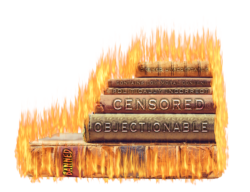
Well, we just missed the actual Banned Books Week, which was at the end of September, but someone sent me a great article and infographic about banned books, so I will put a link to it in this post.
It was Isaac Asimov who said, “Any book worth banning is a book worth reading.” That certainly seems to be true, as so many of the classics we read in high school have been banned books: Nineteen Eighty-Four, Huckleberry Finn, Catcher in the Rye — even Harry Potter. Many of you of a certain age may have read Hawthorne’s The Scarlet Letter in high school. Not I. Nope. It was banned in my high school (I guess because of what the scarlet letter — A — stood for), so we read The House of the Seven Gables instead. I am quite sure The Scarlet Letter was more interesting!
But times have changed. When I was student teacher, my high school seniors read A Clockwork Orange, which I am quite sure is on the list of banned books. I wasn’t, however, allowed to show the movie. And when I taught junior high, I had my advanced students read Nineteen Eighty-Four.
The Marshall University Libraries conduct research on banned books in the United States and have defined a banned book as one that has been “removed from a library, classroom, etc.,” and a challenged book as one that “has been requested to be removed from a library, classroom, etc.” During the 1600s books were often banned by burning them. The burning of William Pynchon’s pamphlet, The Meritorious Price of Our Redemption, by the Puritan government in Boston, Massachusetts, is often referred to as the “first book burning in America.”
Books are usually banned by schools, libraries, and school boards. Some of the reasons books are banned are as follows:
Social – These books may include racial content, drug use, and deviation from social and sexual “norms.” Holden Caulfield in The Catcher in the Rye disrespected social norms and used vulgar language. Mark Twain used vulgar language in The Adventures of Huckleberry Finn.
Political – Books banned for political reasons include The Communist Manifesto and Nineteen Eighty-Four, which was considered to be pro-Communist (and contain explicit sex as well).
Sexual – Lady Chatterly’s Lover by D.H. Lawrence , Tropic of Cancer by Henry Miller and many more fall into these common category, including The Scarlet Letter in my high school!. I was surprised to read that Flowers for Algernon was challenged because of sexual content. I never read it or taught it, but it was taught to eighth graders at the school where I taught from before I came to after I left.
Religious – On the Origin of Species by Darwin because it discussed evolution. The Harry Potter books have often been challenged by parents and school boards because they are thought to promote witchcraft and occultism.
I highly recommend this article that was send to me by Global English Editing. It shows a map of what books are banned where, gives a history of the banning of books, and talks about some of the banned books and where they are banned. Please click to read the article.
Thank you to geediting.com.
And thanks to Wikipedia for much of my information.



It was at a flea market here in France. An English couple was selling it.
Lucky find!
I am the proud owner of a forbidden book! It is in a German edition company, Tauchnitz Edition in Leipzig, dated 1930, of Oscar Wilde’s The Importance of Being Earnest. The book is in English and it says on the cover: Not to be introduced into the British Empire and U.S.A.
Needless to say, this book is protected in my library.
Wow! Love the comment on the cover….definite keeper! Where did you get it?
Asimov was certainly right.
The problem with any form of censorship is that it always seems all right all the time YOU are the censor but it suddenly stops being all right when you are the one being censored
Excellent point!
Silly, baseless, partisan reasons for some of the banned books, eh? I’m looking at the titles of the books banned for political reasons, in particular.
Yes…Asimov was certainly right!